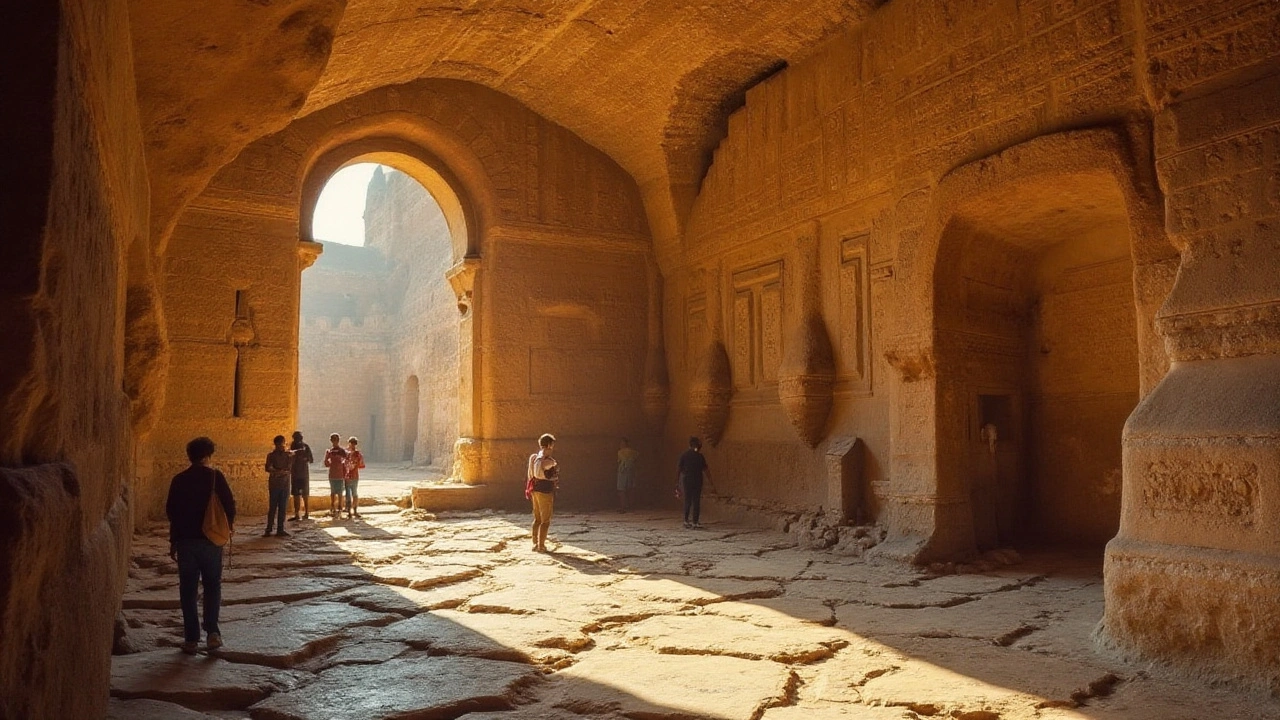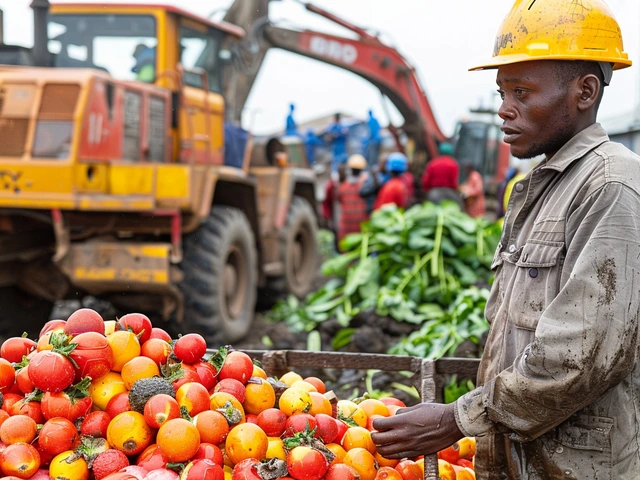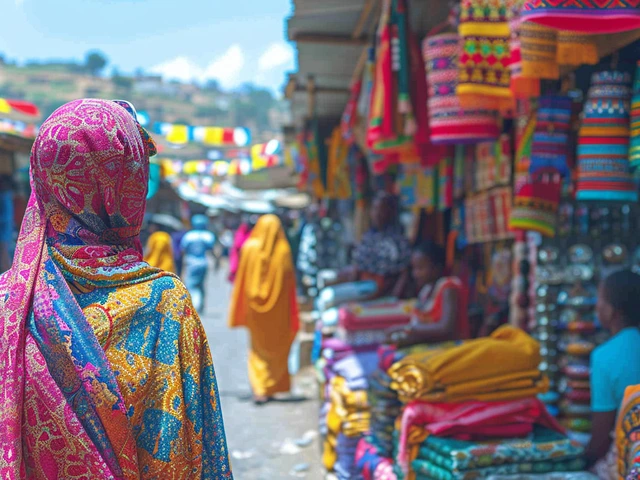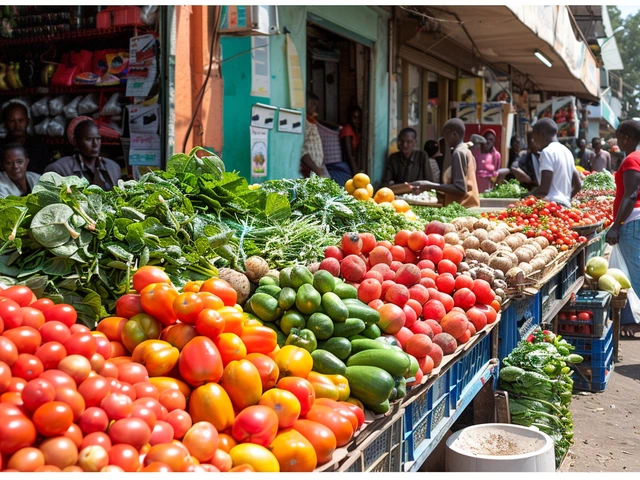Ethiopia is a country that often surprises with its awe-inspiring landscapes and rich cultural tapestry. Whether it's the striking fields of teff stretching to the horizon or the bustling coffee ceremonies that are a cornerstone of social life, there's an exceptional variety here which has much to offer.
Each sector in Ethiopia has its unique charm and importance, from agriculture and coffee to art, culture, and technology. Let's delve into why these fields are so special and what makes them the best in Ethiopia.
- Agriculture: The Backbone of Ethiopia
- The Coffee Culture Phenomenon
- Tourism Tied to Nature and History
- The Flourishing Art and Music Scene
- Emerging Technology and Innovation
Agriculture: The Backbone of Ethiopia
When one thinks of Ethiopia, it’s impossible to ignore the vital role of agriculture in its economy and daily life. This East African nation has a diverse agricultural landscape that includes everything from smallholder farms to large commercial plantations. The country's varied climate allows for the cultivation of numerous crops, each contributing significantly to the nation's well-being and economic stability.
Coffee, often termed as Ethiopia's
The Coffee Culture Phenomenon
When people think of Ethiopia, its rich tradition of coffee cultivation and consumption often springs to mind. Coffee, or 'bunna' as it's called locally, isn't just a drink here. It's a ritual, a symbol of hospitality, and an integral part of daily life. Ethiopia is considered the birthplace of coffee. The legend says that a goat herder named Kaldi discovered the stimulating effects of coffee beans after his goats ate them and became lively. This story has been passed down through generations and reflects the deep historical roots of coffee in Ethiopian culture.
The country's diverse landscapes offer the perfect conditions for growing some of the world's most sought-after coffee beans, including varieties like Yirgacheffe, Sidamo, and Harrar. These regions produce beans with unique flavors that have earned them international acclaim. According to the Ethiopian Coffee and Tea Authority, the country produces around 400,000 tons of coffee annually, with approximately half of this exported to the global market. The other half is enjoyed locally, often during traditional coffee ceremonies that are social events as much as they are culinary experiences.
The traditional Ethiopian coffee ceremony is an elaborate process that can take several hours. It begins with roasting raw green beans over an open flame, followed by grinding them using a mortar and pestle. The ground coffee is then brewed in a special pot called a 'jebena.' The ceremony isn't complete without sharing three rounds of coffee, known as 'abol,' 'tona,' and 'bereka,' symbolizing a progression that signifies respect and community bonding. Participating in this ritual is almost a meditative experience, inviting relaxation and connection.
Ethiopia's commitment to its coffee culture also extends to innovation and sustainability. In recent years, there has been a push towards organic farming and fair-trade practices to ensure that coffee production remains sustainable both for the environment and for the farmers who depend on it. Initiatives like the Ethiopian Coffee Forest Forum aim to protect coffee-growing regions while improving the livelihoods of local farmers.
"Ethiopia is not just a country that grows coffee; it's where coffee grows wild. This unique biodiversity offers a reservoir of genetic resources that can help address future agricultural challenges," said agronomist Aklilu Woldemariam.
Beyond its economic significance, coffee plays a crucial role in Ethiopia's social and cultural life. It is common to see friends and family gathering to share stories and build relationships over multiple cups of freshly brewed coffee. You could say that coffee is the glue that holds communities together, offering a moment of respite in an often-busy daily routine.
For coffee lovers around the world, a visit to Ethiopia offers a unique opportunity to experience this phenomenon firsthand. From visiting coffee farms to participating in traditional ceremonies, there's much to explore and learn. The country's coffee culture is a testament to its rich heritage and its way of life, making it one of the best fields Ethiopia has to offer.

Tourism Tied to Nature and History
When it comes to tourism, Ethiopia is a destination that seamlessly blends natural beauty with historical wonders. Every corner of this fascinating country tells a story, magnifying its draw for travelers from all walks of life. The stunning Simien Mountains, characterized by jagged landscapes and deep valleys, provide a playground for adventurers. These mountains are recognized as a UNESCO World Heritage Site, offering breath-taking vistas and remarkable biodiversity, including the rare Ethiopian wolf and the Gelada baboon.
Balance this rugged experience with a visit to the Omo Valley, an area known for its incredible cultural diversity. Home to more than 16 distinct tribes, the Omo Valley is a testament to Ethiopia’s rich tapestry of human history. The people here maintain traditional lifestyles, and visiting provides a rare glimpse into ways of living that have remained unchanged for centuries. Many find the experience transformative.
On the historical front, Lalibela stands out. Often dubbed the 'New Jerusalem,' Lalibela features eleven medieval monolithic cave churches from the 12th and 13th centuries, carved directly out of rock. Walking through these churches feels like stepping back in time. According to UNESCO, these structures are “a unique artistic achievement, in their scale, the quality of their details, and in the variety of their design.”
"Ethiopia is a veritable paradise for historians and naturalists alike. The country's endless sites of historical importance and breathtaking landscapes make it one of Africa’s most compelling destinations," - National Geographic.
The Great Rift Valley should not be missed either. This geographical marvel spans over several countries, but its reach within Ethiopia is particularly captivating. Here, travelers can explore a series of lakes, each with its own unique ecosystem and appeal. Lake Tana, the largest lake in Ethiopia, is also the source of the Blue Nile River. Along its shores, visitors can find monasteries dating back to the 14th century, housing ancient relics and beautifully illustrated religious texts.
Finally, Axum, the former capital of the Kingdom of Aksum, introduces you to ancient relics and archaeological treasures. This city is home to the famous Obelisk of Axum and is believed to be the final resting place of the Ark of the Covenant, located at the Church of Our Lady Mary of Zion. Both locals and tourists find the spiritual ambiance of Axum truly compelling.
Touring Ethiopia offers a chance to see nature and history intertwine. Whether climbing the peaks of the Simien Mountains or tracing the steps of ancient emperors in Lalibela and Axum, each day in Ethiopia unfolds like a chapter in a grand novel. From nature enthusiasts to history buffs, Ethiopia’s varied landscapes and rich historical background have something to captivate everyone.
The Flourishing Art and Music Scene
Art and music have always been integral parts of Ethiopian culture. In recent years, the country's art and music scene has experienced a resurgence, blending traditional elements with modern influences. Live music venues in Addis Ababa, for example, offer a range of genres from jazz to traditional Ethiopian music, showcasing the rich diversity that defines the nation.
Artists like Mulatu Astatke, the father of Ethiopian jazz, have helped to elevate Ethiopia's musical profile on a global scale. His unique style, which fuses jazz with traditional Ethiopian melodies, has inspired a new generation of musicians. You can hear his influence in the works of contemporary artists who are pushing the boundaries of what Ethiopian music can be.
The visual art scene is equally vibrant. Addis Ababa's art galleries are thriving, hosting exhibits that range from traditional paintings to contemporary installations. Places like the Zoma Museum offer a holistic experience that combines art, culture, and architecture, making it a must-visit spot for art lovers. Local artists are not just confined to galleries; street art is becoming increasingly popular, adding a splash of color and creativity to urban landscapes.
Ethiopian dance is another powerful form of artistic expression, often performed during cultural festivals and celebrations. The Eskista, a traditional dance characterized by shoulder and chest movements, is both captivating and a significant cultural symbol. This dance not only entertains but also serves as a way to preserve and pass on cultural heritage.
"Ethiopia's art scene is a melting pot of tradition and modernity," says art critic Tadesse Alemu. "It reflects the country's history while looking towards the future."
Supporting this artistic wave are various institutions and initiatives aimed at nurturing young talent. Schools dedicated to the arts are becoming more common, and community-based projects offer platforms for emerging artists to showcase their work. The annual Addis Foto Fest, for instance, highlights the talents of photographers both local and international, offering a visual feast that provides different perspectives on life in Ethiopia.
Technology is also playing a role in the evolution of art in Ethiopia. Digital art forms and tech-driven installations are becoming part of the artistic dialogue, opening up new avenues for creativity. Online platforms are giving artists the opportunity to reach global audiences, breaking geographical boundaries and expanding their influence.
Film is another medium where Ethiopia is making strides. Filmmakers are telling compelling stories that resonate both locally and internationally. The Ethiopian International Film Festival provides a platform for these storytellers, celebrating the rich narratives that come from this diverse land.
In summary, Ethiopia's art and music scene is a thriving ecosystem that encapsulates the nation's rich cultural heritage and innovative spirit. It offers a glimpse into the soul of Ethiopia, making it a critical component of what makes the country so unique.

Emerging Technology and Innovation
In recent years, Ethiopia has made remarkable strides in the field of technology and innovation. The country's burgeoning tech scene is transforming the landscape in various sectors including agriculture, healthcare, and education. This rise is fueled by a young, energetic population eager to embrace the digital age and push Ethiopia to the forefront of technological advancement.
A cornerstone of this development is the establishment of technology hubs like iceaddis, Ethiopia’s first innovation hub, co-working space, and tech startup incubator. Founded in 2011, iceaddis has been a launch pad for numerous startups and has created a vibrant community of tech enthusiasts and entrepreneurs. This dynamic environment nurtures creativity and collaboration, leading to groundbreaking solutions tailored to local problems.
E-commerce is another sector witnessing rapid growth. Platforms such as Jumia Ethiopia are revolutionizing the way people shop, providing access to a plethora of products at the click of a button. This shift not only improves convenience but also boosts the economy by fostering a new marketplace for buyers and sellers.
The government is also playing a pivotal role in this transformation. Investments in infrastructure like the Ethio ICT Park in Addis Ababa are creating conducive environments for both local and international tech companies to thrive. These investments signal a commitment to integrating technology deeply into the fabric of Ethiopian society. Dr. Getahun Mekuria, Minister of Innovation and Technology, was quoted saying,
“Our vision is to build a digital Ethiopia that leaves no one behind. Technology should work for everyone and improve the lives of all citizens.”
One of the most exciting areas is fintech, where innovation is driving financial inclusion in ways never seen before. Companies like M-BIRR offer mobile money services, bringing financial transactions to millions who were previously unbanked. This innovation not only offers convenience but also propels economic growth, especially in rural areas.
Edtech is also making significant headway. Startups like Gebeya provide training in IT and software development, preparing the younger generation for the demands of the global digital marketplace. These platforms empower students with skills that are not only in demand but also lucrative, thereby ensuring a brighter future.
Healthcare is undergoing a technological transformation as well. Initiatives like TeleMed Medical Services are making healthcare accessible to remote areas through telemedicine. By connecting doctors and patients via digital platforms, these services are saving lives and making healthcare more efficient and widespread.
It’s clear that the spirit of innovation is alive and well in Ethiopia. With continuous support and investment, this technological evolution promises to elevate the country to new heights. From solving pressing local issues to making strides on the global stage, Ethiopia’s emerging technology and innovation sector is a beacon of hope and progress.

 Is Addis Ababa Safe for Career Opportunities? A Comprehensive Guide
Is Addis Ababa Safe for Career Opportunities? A Comprehensive Guide
 Understanding Ethiopia's Employment Structure: Key Aspects and Insights
Understanding Ethiopia's Employment Structure: Key Aspects and Insights
 Exploring Professions in the Bible: Ancient Jobs and Roles
Exploring Professions in the Bible: Ancient Jobs and Roles
 Starting a Business in Ethiopia: Opportunities, Challenges, and Tips for Entrepreneurs
Starting a Business in Ethiopia: Opportunities, Challenges, and Tips for Entrepreneurs
 Cost of Living in Ethiopia 2024: Expenses for a Comfortable Lifestyle
Cost of Living in Ethiopia 2024: Expenses for a Comfortable Lifestyle
pradeep kumar
August 24, 2024 AT 17:35Your glorified list reads like a travel brochure written by a marketing intern. Agriculture is not a meme; it's a relentless grind for subsistence farmers. Coffee ceremonies are romanticized, but they hide the labor exploitation behind every bean. The “richest fields” hype ignores the systemic poverty that plagues the countryside. No wonder you’re dazzled by pretty pictures.
love monster
August 26, 2024 AT 11:15The post offers a comprehensive overview of Ethiopia's sectoral diversification, leveraging multidisciplinary frameworks to contextualize agrarian value chains. It's encouraging to see the integration of cultural capital into economic narratives, which may foster sustainable development pathways.
Christian Barthelt
August 28, 2024 AT 04:55While the terminology is impressive, the article mistakenly pluralizes “culture” when referring to coffee ceremonies, which are singular cultural practices. Moreover, the claim that coffee production “produces around 400,000 tons” conflates weight with volume; the correct metric should be metric tonnes.
Ify Okocha
August 29, 2024 AT 22:35The lavish prose masks the reality that most Ethiopian farms operate on less than two hectares, making the notion of “rich fields” a deceptive fantasy. Your optimism feels like a veneer over structural inequities.
William Anderson
August 31, 2024 AT 16:15Reading this feels like strolling through a curated gallery of clichés, each section polished to the point of artificial brilliance. The author paints Ethiopia with the same broad brush that art critics reserve for over‑hyped avant‑garde exhibitions.
Sherri Gassaway
September 2, 2024 AT 09:55One might argue that the pursuit of authenticity is itself a construct born from the desire to impose meaning upon the chaotic tapestry of human experience.
In the case of Ethiopia, the layers of history, geography, and societal evolution intertwine so densely that any attempt at simplification inevitably erodes nuance.
When a narrative reduces the nation to a series of appealing bullet points, it not only commodifies its heritage but also silences the dissenting voices within.
These voices-farmers battling climate volatility, musicians navigating the tension between tradition and global markets-offer a counter‑weight to the glossy portrait.
The coffee ceremony, for instance, is not merely a pleasant ritual but a performative act that reinforces social hierarchies and gender roles.
Similarly, the celebrated rock formations of the Simien range serve as backdrops for adventure tourism, yet they mask the displacement of indigenous communities.
If we interrogate the economic data, we see that export‑driven coffee revenues constitute a precarious dependency, vulnerable to fluctuating world prices.
Technological hubs like iceaddis herald progress, but they also risk creating urban enclaves of privilege that bypass rural disenfranchisement.
Thus, the narrative of unmitigated advancement must be tempered with an awareness of systemic inequality.
Philosophically, the tension lies between celebrating cultural vibrancy and recognizing the exploitation embedded within.
The article’s tone suggests a harmonious convergence, yet history teaches us that such convergence often arrives at great human cost.
Acknowledging this dissonance does not diminish Ethiopia's achievements; rather, it enriches our understanding of them.
It invites a deeper engagement that moves beyond superficial admiration toward a solidarity that respects agency.
In this light, the richest fields are not merely those of coffee beans or teff stalks, but the fertile grounds of critical inquiry.
Therefore, any genuine appreciation must be accompanied by a willingness to confront the uncomfortable realities that accompany progress.
Milo Cado
September 4, 2024 AT 03:35Thank you for the detailed overview; it truly broadens my perspective on Ethiopia's multifaceted growth 🌍.
MONA RAMIDI
September 5, 2024 AT 21:15The article romanticizes Ethiopia like a telenovela, glossing over the gritty hardships that ordinary citizens endure daily.
grace riehman
September 7, 2024 AT 14:55yo fam, Ethiopia's culture is lit! love how they keep them tradtional vibes alive while pushin the tech forward.
Vinay Upadhyay
September 9, 2024 AT 08:35Sure, because “lit” and “pushin” are the scholarly descriptors that will convince anyone of Ethiopia’s economic seriousness; perhaps next you’ll replace “agriculture” with “farm stuff”.